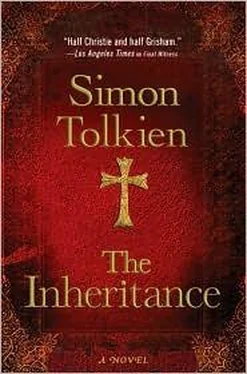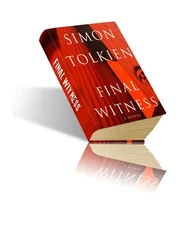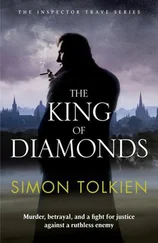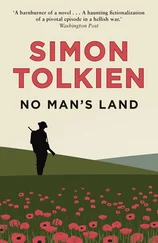Simon Tolkien - The Inheritance
Здесь есть возможность читать онлайн «Simon Tolkien - The Inheritance» — ознакомительный отрывок электронной книги совершенно бесплатно, а после прочтения отрывка купить полную версию. В некоторых случаях можно слушать аудио, скачать через торрент в формате fb2 и присутствует краткое содержание. Жанр: Полицейский детектив, на английском языке. Описание произведения, (предисловие) а так же отзывы посетителей доступны на портале библиотеки ЛибКат.
- Название:The Inheritance
- Автор:
- Жанр:
- Год:неизвестен
- ISBN:нет данных
- Рейтинг книги:4 / 5. Голосов: 1
-
Избранное:Добавить в избранное
- Отзывы:
-
Ваша оценка:
- 80
- 1
- 2
- 3
- 4
- 5
The Inheritance: краткое содержание, описание и аннотация
Предлагаем к чтению аннотацию, описание, краткое содержание или предисловие (зависит от того, что написал сам автор книги «The Inheritance»). Если вы не нашли необходимую информацию о книге — напишите в комментариях, мы постараемся отыскать её.
The Inheritance — читать онлайн ознакомительный отрывок
Ниже представлен текст книги, разбитый по страницам. Система сохранения места последней прочитанной страницы, позволяет с удобством читать онлайн бесплатно книгу «The Inheritance», без необходимости каждый раз заново искать на чём Вы остановились. Поставьте закладку, и сможете в любой момент перейти на страницу, на которой закончили чтение.
Интервал:
Закладка:
“It is beautiful, isn’t it?” the cure said, pointing with a sweep of his hand at the ruined chateau and the old grey stone church and, beyond them, the blue-black lake whose surface was now a mass of silver raindrops. “But it’s a strange place too. There’s an atmosphere here. Something you can’t quite put your finger on. I suppose if I believed in ghosts, I’d expect to find them here.”
A faraway look had appeared in the cure’s eye for a moment, but he recovered himself with a laugh. “You must forgive me for being foolish,” he said. “Priests aren’t supposed to talk about ghosts. Go and see Marcel Laroche if you have time. You’ll like him, and maybe he can help you with some of your questions.”
In the afternoon Trave walked out beyond Moirtier into the Norman countryside. The rain had stopped and the cold air smelt surprisingly fresh and full of promise, even though it was winter and the trees were black and leafless. A few cars passed every so often, and once a tiny aeroplane flew out toward the Channel, leaving a white line drawn high across the blue cloudless sky, but for most of the time everything was silent, and Trave walked to the sound of his own footsteps on the road.
It had turned into a beautiful day, but Trave took in very little of his surroundings as his mind turned over and over the words of the cure back at Marjean Church. “The Rocards had a little girl, but she died.” Why then had he found no trace of her at the records office in Rouen? He remembered now. The clerk had said that the records for the two years before the invasion had been destroyed by enemy bombing. If the Rocards’ daughter had been born in 1938, then there would be no birth certificate in Rouen. And no wonder Stephen’s lawyers hadn’t looked any further for missing children. Madame Rocard had been childless up to the age of forty-five. There was no reason to think that she wouldn’t stay that way. The girl was a war child. Had Cade missed her too? Stephen had said that his father wanted something at Marjean. A valuable book. Even if he had gone there before the war to try to get it, he still wouldn’t have been able to go back until after D-day. A gap of four years or more. Perhaps Cade never knew about the Rocards’ little daughter.
But the cure had said she was dead. And yet there was no death certificate. She hadn’t just died-she’d disappeared into thin air. Unless that was deliberate. What if all record of her had been removed so that she could grow up invisible, biding her time until she was ready to revenge herself on John Cade, who had killed her father and mother in cold blood? What if the elusive Frenchman in the Mercedes was her accomplice, waiting by the telephone box outside Moreton Manor in case he was needed on that Friday night back in June when Cade had been shot through the head? Executed with a single bullet.
And who had been inside the manor house for eighteen months before that night, learning how everything worked, preparing for the appointed day when Cade would get his just deserts? Sasha Vigne. And it was Sasha who had run away the day before. She’d done that because she had something to hide, and she was still here somewhere. Trave was sure of it. Gone to ground in one of these little towns or villages, waiting for Stephen Cade to die and Trave to go home. Because with Stephen’s execution, her revenge would be complete. Father and son would have paid for the murder of her own mother and father. An eye for an eye and a tooth for a tooth. Old Testament justice.
A car horn sounded suddenly close behind Trave, shattering the peace of the day. He had unconsciously drifted into the middle of the road while he built his theories up like castles in the winter air, and now he had to step quickly back onto the verge to let a builder’s truck go by. For a moment he thought it was the same white van in which Sasha and her friend had accelerated away from Marjean Church the day before, but he soon realised his mistake. This truck was far bigger. The one yesterday had looked like a very run-down vehicle. And the frightened driver hadn’t been Trave’s idea of a cold-blooded conspirator who drove a Mercedes round the English countryside, plotting the murder of an Oxford University professor. No, he wasn’t Mr. Noirtier, and Sasha was probably not the Rocards’ daughter either. Because that girl was almost certainly dead. Burnt to death in her family home in the late summer of 1944, just like the cure had said.
Whatever happened, this wild-goose chase would have to come to an end soon. He’d told Clayton that he’d be back in England by Monday evening, and Trave intended to keep to that. He’d see the policeman, Laroche, in the morning, and after that he could do no more. Enough was enough. Turning back toward Moirtier-sur-Bagne, Trave realised with a start that the sun had almost set, and he had gone much farther down the road than he had intended. The temperature was colder now, and he would have to hurry if he was going to get back to his hotel before dark. He shivered, pulling his inadequate coat around him, and inside he felt the onset of a black despair. He’d been in France for almost a week now, and he’d accomplished nothing except to fritter away what little time was left before Stephen’s neck was broken. He cursed and swore, and his angry words made little volleys of white smoke in the thin, cold air, until he finally desisted, realising what a comical figure he must seem, a middle-aged man with unkempt hair and crumpled clothes scurrying through the deserted French countryside on a Sunday evening, swearing in English at nobody at all.
Marcel Laroche was an imposing figure. He was six foot four and carried himself militarily erect even though he was in his late fifties. But it was more than sheer physical size that gave him such a commanding presence. He had fought with the Free French in North Africa during the first years of the war and had then been parachuted into northern France to help the Resistance around Caen in the preparation for D-day. He had seen things that others hadn’t, and his wartime experiences seemed to have given his character an unusual depth, which Trave found oddly attractive.
He was expecting Trave, and as soon as the Englishman came through the door of the police station, Laroche picked up his hat and coat, clapped his subordinate on the shoulder, and took Trave across to the cafe on the other side of the square where they sat drinking hot black coffee by the open window.
Laroche seemed genuinely touched when Trave asked after the health of his sister in Lille. “She’s dying,” he said simply. “But we don’t discuss it. And she won’t give in, which makes it harder. I hope for her sake that it will end soon. But you’re not here to talk about me, Inspector,” he added with a smile. “My deputy told me that you’re interested in the Rocards.”
“Yes. A young man in England says that his father killed them, not the Germans.”
“Well, that’s simply not true,” said Laroche, surprised. “The Nazis did it. Everyone knows that. The British just didn’t get to Marjean in time to stop them. That’s all they did wrong.”
“Were you here when it happened?” asked Trave.
“No. My unit didn’t come this way. We were with the Americans, farther south. But I came back here after the war, and obviously I heard about what had happened. In detail. There were German bullets in the bodies.”
“What about the Rocards’ little girl? What about her body?”
“That was different. She was burnt in the fire at the house. The housekeeper was in there too, and they both died. It doesn’t bear thinking about.”
“There’s no death certificate for the girl in Rouen,” said Trave baldly. “I checked.”
“Well, I can’t explain that. Except that it was near the end of the war, and a lot of documents went missing everywhere. It couldn’t be helped.”
Читать дальшеИнтервал:
Закладка:
Похожие книги на «The Inheritance»
Представляем Вашему вниманию похожие книги на «The Inheritance» списком для выбора. Мы отобрали схожую по названию и смыслу литературу в надежде предоставить читателям больше вариантов отыскать новые, интересные, ещё непрочитанные произведения.
Обсуждение, отзывы о книге «The Inheritance» и просто собственные мнения читателей. Оставьте ваши комментарии, напишите, что Вы думаете о произведении, его смысле или главных героях. Укажите что конкретно понравилось, а что нет, и почему Вы так считаете.












